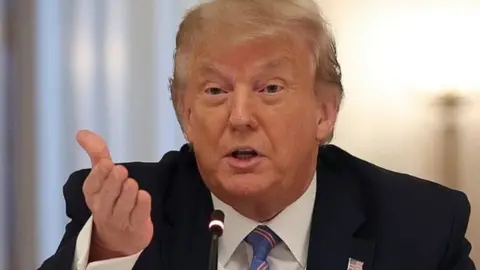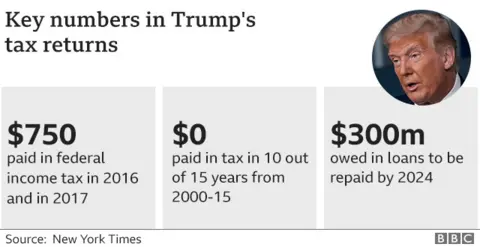Trump's taxes: What you need to know
 Getty Images
Getty ImagesThe New York Times has obtained decades of tax information on US President Donald Trump.
The records reveal "chronic losses and years of tax avoidance", the newspaper says.
The report, which Mr Trump has called "fake news", comes a little over a month before the presidential election, when he will take on Democratic nominee Joe Biden.
There is a lot to get through, so here are some of the main points you need to know.
What are the report's key allegations?
- The president paid just $750 (£580) in federal income tax both in 2016, the year he ran for the US presidency, and in his first year in the White House
- He paid no such taxes in 11 of 18 years of tax records examined by the newspaper
- The president has managed to lower his taxes through reporting hefty losses on his businesses
- After the success of The Apprentice TV show he did initially pay significant taxes - $95m over 18 years. But he later got most of that back via a $72.9 million federal tax refund. The refund remains under review
- Mr Trump's daughter, Ivanka, has helped reduce the family's tax bill through large "consulting fees"
- He is personally responsible for hundreds of millions of dollars in loans, most of which will come due in the next four years
- He has claimed tax deductions on expenses including $70,000 of hair styling for television

Has Trump done anything wrong?
The New York Times (NYT) reporting alleges large scale tax avoidance, which may be controversial but is not illegal.
Many wealthy Americans use loopholes to reduce the amount of tax they are legally bound to pay.
Even so, in 2017, the average federal income tax rate for the highest-earning .001% percent of tax filers was 24.1%, according to the IRS.
This is about the same as the net average tax rate paid by the average American worker in 2019, according to data from the Organisation for Economic Co-operation and Development.
The NYT says Mr Trump has paid about $400m less in combined federal income taxes over the last two decades compared to a very rich person who paid the average for that group each year.
His presidential predecessors Barack Obama and George Bush often paid in excess of $100,000 in federal income taxes while in office.
The Trump Organization has joined the president in denying the NYT's allegations. The company's chief legal officer, Alan Garten, told the newspaper that "most, if not all, of the facts appear to be inaccurate".
What's the background to this?
Mr Trump has come under fire from Democrats for years for not making his tax returns public as his predecessors did.
His lawyers have argued that he enjoys total immunity while in office and that Congress has no valid justification to seek the records.
In July, the US Supreme Court ruled that Mr Trump's financial records could be examined by prosecutors in New York. In a related case, the court ruled that this information did not have to be shared with Congress.
The matter remains under appeal in lower courts so the records have not been handed over in New York.
Mr Trump has denied wrongdoing and called the investigation into his tax affairs a "witch hunt".
The president also remains engaged in a long-running battle with the Internal Revenue Service (IRS) over the $72.9m tax refund he received. He could be forced to pay more than $100 million if a ruling were to go against him, the NYT says.
How serious could this be for Trump?
The president will certainly have to face many more questions over these allegations in the run-up to the 3 November election. It is a matter likely to come up in the presidential debates.
He is trailing Joe Biden in opinion polls, as the Democrats and other critics continue to accuse him of mishandling the coronavirus crisis.
The allegations of tax avoidance will not be welcomed by his campaign, as millions of Americans deal with the financial fallout from the pandemic.
At the same time, it's unclear how much political damage this will do. Four years ago, when Hilary Clinton upbraided him over how little tax he paid, Mr Trump replied: "That makes me smart."
Several leading Republicans have backed him on that.
This is also far from the first controversy Mr Trump has needed to overcome in the run-up to an election.
He won the 2016 election despite a barrage of sexual misconduct allegations and the emergence of a video in which he used vulgar language about women.
